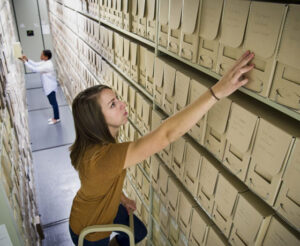
Plan your visit
Donations — One Year Later
August 12, 2021

Early last summer, I wrote a blog outlining some of the basics about contributing historical materials to the Indiana Historical Society (Thinking About a Donation to IHS? These Guidelines Will Help). After reflecting on a time unlike any other and marked by a period accentuating the highest number of prospective donor contacts and acquisitions we’ve yet recorded, it seems altogether appropriate to revisit and review some aspects of the process a year later – and what makes it work smoothly for everyone. I’ll share highlights of lessons learned from a library collection person’s steady observation and experience.
Assess What You Have
When people are managing the cumulative materials of a lifetime, whether their own or those of family members or friends, I cannot stress strongly enough the importance of examining, assessing, and reflecting on the nature and specifics of the material. Don’t rush. Take the time to examine all things individually. Keep the big picture in mind, but also the component parts. Sort materials into groups and arrange by subject. It may help in determining all that is there, or if there are interconnected subjects found among various materials. Look for likely ties and associations found among the disparate parts. What may not make sense at the beginning of a stack may reveal a relevance later while working your way through other material. Identify what you can. Never underestimate the benefit that creating a good inventory may lend to the process. It can help you organize your thoughts and materials while also providing IHS or other prospective bodies with essential information. Ultimately, it may save you a great deal of extra effort.
Do the Homework
It pays to take information cultivated from an assessment to determine the next steps. Where will your materials be the most useful? Have you consulted any websites or online library catalogs to investigate collecting interests and possible needs of a recipient institution? Long-established organizations may have had ample time to collect representatively in areas of known strengths, so many standard sources may be covered adequately. For example, IHS has collected and maintains all book and serial publications originating with the IHS Press and its publishing efforts, so those spare copies of Traces or INPerspective you may seek to return are not needed. In addition, an impressive collection of Indiana imprints has been long established in the IHS Library, spanning the state, the Midwest, and the Old Northwest Territory, so coverage is excellent in a variety of key subjects, though perhaps not quite as strong in sources from the past twenty years or so. To check the IHS Library’s catalog, go to this link and explore:
https://indianahistorylibrary.on.worldcat.org/discovery
Whenever possible, please save yourself multiple emails or calls back and forth by fully assessing material and seeking more clarification or guidance toward the end of your organizing effort, once you’ve examined materials fully. Your inventory will help synthesize the contents, and a likely recipient institution will thank you gratefully for minimizing the time necessary to manage a prospective acquisition.

The IHS staff secures the order of processed collections in the IHS library stacks.
Material Type Counts
The Archives and Library of IHS is a paper-based collecting repository, so most inquiries regarding objects and artifacts will be referred to institutions primarily engaged with collecting and interpreting those objects. At times, a body of material offered may consist of a mix of archival and published works as well as representative artifacts and material culture. In such cases, there may be opportunities for some items to go to different collections. For example, the Indiana Historical Society often works cooperatively with the Indiana State Museum when examining some groups of mixed material, and, upon approval of the donor, some collections can be separated, with paper materials and research documents coming to IHS and objects going to ISM. A documented paper trail connects material held between the institutions, and the electronic intellectual records – the catalogs and databases – help establish links between materials given, their location, and donors associated with those acquisitions. That history isn’t lost. If questions arise about what should go where, we can provide some guidance.
Some Surprises Dismay
Sending or depositing material with an institution unannounced or without prior notice is both frustrating and costly. Providing an institution with ample notice and an outline or inventory of material for potential donation is both a thoughtful and useful part of being a good donor. Do remember that recipient institutions and not-for-profits are duty-bound to manage all material received and cannot discard it, even if a donor encourages or approves it. IHS must make an effort to return unwanted material to its source. If that isn’t possible, the time-consuming and sometimes labor-intensive process of deaccessioning must take place.
Make An Appointment
Once you’ve reached the point where you are prepared to extend an offer of donation, please make an appointment to assure that time is set aside devoted to doing the work. A set appointment solidifies a commitment of both parties to the task–with ample time devoted to your needs as a prospective donor and for IHS staff to gather essential documentation and information to help both with the process and with gaining the history that will aid future researchers. If a conflict arises, we appreciate being kept informed so we can open the appointment time to another person. Likewise, when a potential donor expresses firm interest and apparent intent to make a donation and we hear nothing for weeks, months, or even years, it does leave us wondering. Keeping us informed helps.
Consider a productive time to reach out to make contact with IHS or to schedule an appointment. Holiday times often see increased traffic, but staff members may also be away at these times, so it is both wise and helpful to plan in advance. Mailing also provides a beneficial and necessary option when a personal meeting is not possible. For those unable to visit IHS onsite and who may need to mail material, please keep us informed during the process and let us know when a package has been posted. Mail service can be unpredictable, so it is helpful to have some understanding that a mailing is in transit to IHS. Be aware that most all donated photos and documents presented in a framed format will be removed from their housings for long-term preservation, stability, and ease of use.
The Remainder
If there are excess materials not needed or accepted for collections of the libraries, historical societies, museums, or other institutions that you have contacted, what do you do with what is left? The subject matter, depth of content, and breadth of a collection may help assess its usefulness to other prospective repositories. To be clear, there are many materials privately collected or among a family’s belongings that the Indiana Historical Society generally would not be inclined to acquire or collect:
- Spare copies of IHS serials are generally not needed. Consider local and public library branches, senior centers, and retirement facilities, or recycle.
- Similarly, unwanted books and other publications may find a use or second life through similar avenues or through library fundraising book sales, like the Indianapolis Public Library Foundation. Some antique malls may help in selling them, or places like Half Price Books may realize some return through resale or other uses.
- Sheet music and songbooks of a general nature are not often accepted. IHS has an outstanding body of representative Indiana sheet music from many decades, and we have reached the saturation point, though there are rare exceptions made.
- We do not collect popularly saved newspaper headlines of national and tragic events: deaths or assassinations of famous leaders, war endings, moon landings, floods, blizzards, and other major catastrophes. Please be assured, nearly every family had copies of famous news headings saved somewhere at home—in closets, the attic, a cedar chest—most of them now yellowed, brittle, and withering away. These are neither rare nor valuable, in almost all cases. Newsprint degrades quite rapidly, and as nearly all newspapers have been microfilmed, digitized, or made quite accessible through online resources, IHS has no need for or desire to expend resources on preserving hard copies of newspapers or newsprint headlines. Many other repositories proceed likewise.
- No, we do not generally collect abstracts of private homes. The information and history about a residence are most helpful to the homeowner, so it is usually recommended to keep this documentation for any subsequent owner of a property. Generally, property owners are the individuals who need or seek this information most. IHS has a small, representative number of property deeds and abstracts which is sufficient.
- We do not have the ability to collect paintings and other artworks on any scale or to make them available for researchers, so it is most effective to explore other options. These resources may be desirable among a variety of community art museums around the state (Lafayette, Terre Haute, Richmond, Bloomington, Evansville, Fort Wayne, South Bend and others), particularly if not needed by some of the larger art and cultural institutions.
- Types of materials most commonly collected by families in the 20th century have included newspaper headlines of major national events, school textbooks, yearbooks, and family Bibles. Most are not collected by the IHS, though there could be other outlets for each of these materials.
I trust these guidelines will be beneficial, and I wish you a fruitful and productive exploration as you undertake the managerial processes of sorting, assessing, identifying, and narrowing the scope of materials found from productive downsizing, housecleaning, or pandemic streamlining efforts.
At any step in the process, feel free to contact me via email: emundell@indianahistory.org. We welcome the dialogue.
Thanks, and happy digging!









